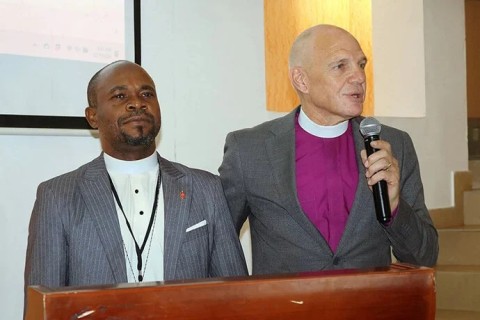Methodist split in Nigeria linked to deadly violence

Bishop John Schol (right), lead bishop of the Nigerian Episcopal Area, speaks after Ande Emmanuel is elected bishop during the UMC's West Africa Central Conference meeting in Accra, Ghana, on December 7. (Photo by Eveline Chikwanah, UM News)
Three United Methodists were killed in clashes between members of the United Methodist Church of Nigeria and the conservative breakaway Global Methodist Church in Munga Dosso, Taraba State.
The December 15 attack followed the gathering of Global Methodist Church members at Bwoi United Methodist Church in the village of Bunkabu. During the confrontation, Elisha Masoyi, 27, was shot and killed.
The fighting spread to the surrounding community, where huts were torched, resulting in the deaths of 4-year-old Abednego and 2-year-old Baby, children of Abraham Kefas, overseer of Divine Success UMCN Nursery and Primary School in the Munga Dosso community. Ten UMC members were injured and are being treated at home.
In a statement, United Methodist Bishop-elect Ande Emmanuel and Nigeria Lead Bishop John Schol condemned the violence and offered prayers and support for those affected.
“As bishops of The United Methodist Church, we are outraged that such an atrocity would occur among Christians, especially brothers and sisters who were once part of the same Methodist family.”
In the statement, they called upon leaders of the GMC, particularly the three bishops who lead Nigeria, to act justly and bring those who perpetrated the crimes to justice.
“We further urge GMC members, at all levels, to put an immediate end to the violence and refrain from disseminating misinformation that fuels fear and disdain that can lead to violence. Likewise, we call our United Methodist members to be guided by integrity and respectful while working towards maintaining peace.”
They encouraged United Methodists to remain peaceful in the midst of conflict and to call the police immediately; they urged the Global Methodist Church members to do the same.
There has been division in the UMC in Nigeria for years. That conflict was heightened by the formation of the theologically conservative Global Methodist Church in 2022 and the resignation of former Nigeria bishop John Wesley Yohanna earlier this year. Yohanna announced in July that he was leaving the UMC and joining the breakaway denomination. Bishop Schol and a team of United Methodist bishops have been overseeing the episcopal area since August.
Schol said he believes GMC leaders are concerned about their future as the UMC in Nigeria continues to make steady progress. He noted that the majority of United Methodist laity and clergy stayed with the denomination.
Furthermore, Schol said that recent events are changing the minds of many, including some people who left the UMC and are now returning.
“A group of 400,000 United Methodists who left during Bishop Yohanna’s tenure have now returned, strengthening the United Methodist witness and mission,” he said.
After more than a half century of debate and defiance over the place of LGBTQ people in the denomination, UMC general conference delegates in May voted to end decades-old bans on the ordination of “self-avowed practicing” gay clergy and the officiation of same-sex weddings.
Delegates also approved a measure that explicitly allows current central conferences to set their own standards for clergy ordination and church marriage rites, so long as those standards are in line with local laws and the denomination’s doctrinal statements.
The West Africa Central Conference 10th session, held December 5-8 in Accra, Ghana, voted to amend its version of the Book of Discipline, the denomination's policy book, to clearly state that in West Africa, the episcopal areas and conferences are to follow the laws of their nation concerning LGBTQ issues and that marriage is between two consenting adults who are a man and a woman. Nigeria’s constitution forbids same-gender marriage.
During the same conference, Emmanuel was elected bishop.
On November 22, Schol emailed Global Methodist Church Bishops Scott Jones, John Pena Auta and Yohanna, the three bishops overseeing Nigeria for the denomination, and expressed his growing concern about harassment, violence, and destruction of property. He also shared with United Methodists these same concerns and called on them to remain peaceful.
“I received no response from them, and the harassment and physical attacks only escalated to culminate in the killing of three United Methodists and injuring of another 10 on December 15,” he said.
GMC leaders did not immediately respond to a request for comment.
The United Methodist Council of Bishops called for peace in Nigeria following the tragedy.
“The Council of Bishops offers its condolences to the families whose loved ones died and to the members of the congregation where the incident took place,” Council of Bishops President Tracy S. Malone said in a statement. “We condemn the violence and plead with all United Methodists to bear witness to the prince of peace, Jesus Christ, in word and deed. We know that violence never resolves conflict or meaningfully addresses injustice.”
The UMC in Nigeria’s dean of cabinet, Eli S. Yakku, said the affected community needs prayers and counseling.
“We are working to promote calm and restraint . . . while also advocating for justice and accountability. This incident is a sobering reminder of the challenges we face as a church and a community in Nigeria.”
Yakku said at least 11 houses of UMC members were set ablaze, displacing many families and resulting in hundreds of people, mainly women and children, fleeing to neighboring communities for safety. Some homes of GMC members also were set on fire.
In a statement issued by the GMC’s communications office in Nigeria, Auta called on the community of Munga Dosso to drop its bitterness and embrace sustainable peace in the best interest of brotherhood and development.
“The bishop acknowledged that the crisis was ignited by an unknown person whose major target was to cause unrest amongst the peace-loving people of the area, emphasizing that what peace cannot offer, chaos cannot give,” the statement said. —UM News





